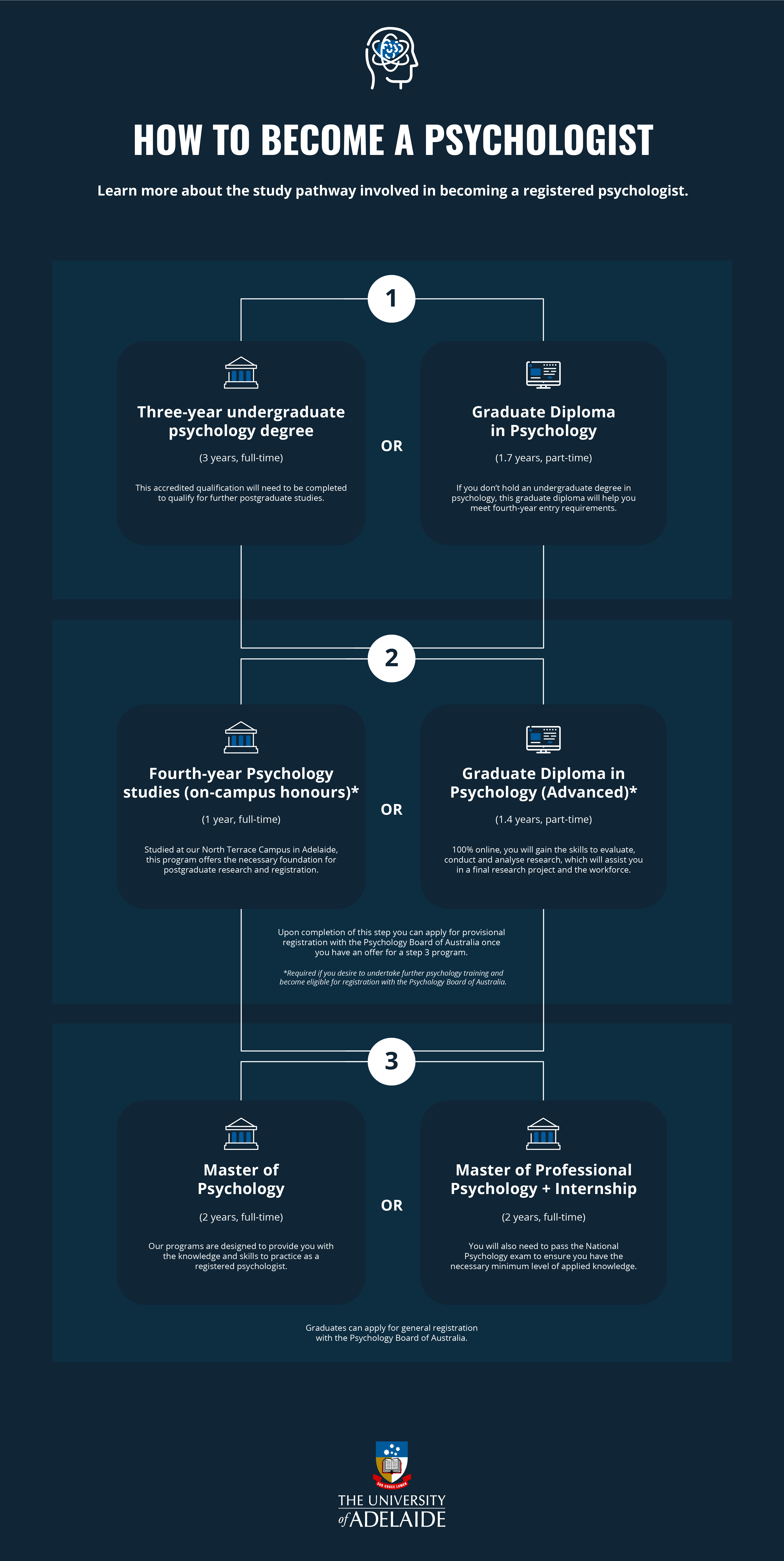How to Become a Psychologist
Psychology is an ideal career choice if you’re fascinated by how the human brain works. But to channel this intrigue into a career and become a registered psychologist, qualifications are required. From undergraduate studies to supervised internships, there are many pathways to becoming a psychologist.
Before pursuing psychology, it’s essential to know where a career in this field can take you and the steps involved with getting qualified.
Study pathway to become a psychologist.

Psychology in Australia
Psychologists have a range of responsibilities related to diagnosing and treating psychological conditions. Improving mental health outcomes in the community involves complex social and ethical considerations, which is why psychologists are required to undertake extensive training.
Australia’s mental health system covers a broad network of support services, requiring input from psychologists across many different fields of practice. The Australian Institute of Health and Welfare (AIHW) estimates that spending on mental health-related services in Australia from all sources (government and non-government) was around $9.0 billion, or $373 per person, in 2015-16.
To effectively support the mental health system, psychologists must be able to apply specific competencies in their work, including:
- A broad understanding of the diagnosis and treatment of mental health issues
- The ability to consult with other health professionals to ensure the effective integration of mental health services
- Advanced research skills
- The ability to communicate with clients and their families
- Provide assessment and recommendations for appropriate treatments.
Studying psychology provides a pathway to developing these critical skills.
Regulatory requirements
To ensure the effectiveness of psychology services in Australia, the profession is highly regulated. All psychologists must be registered with the Psychology Board of Australia, which is responsible for overseeing the profession.
Understanding regulatory requirements is essential for aspiring psychologists, as only practitioners who can demonstrate the skills needed to provide a high standard of care, will qualify for registration.
To achieve registration, candidates are required to complete a total of six years of training, made up of university education and supervised experience.
Getting qualified
Whether you’re considering becoming a clinical psychologist or another area of psychological practice, such as forensic or child psychology, the education and training involved with getting qualified can be broken down into the following steps:
-
Three-year undergraduate psychology degree – Covering psychology fundamentals, you’ll need to complete this Australian Psychology Accreditation Council (APAC) accredited qualification in order to qualify for postgraduate psychology studies. However, if you do not hold an accredited undergraduate psychology degree, successfully completing a Graduate Diploma in Psychology will gain you entry to fourth-year psychology studies.
-
Fourth-year psychology studies – A fourth year of study is required if you wish to undertake further psychology training. Upon completing a Graduate Diploma in Psychology (Advanced) or an honours degree in psychology, you will be eligible for provisional registration with the Psychology Board of Australia.
-
Internship or postgraduate study – After you complete your fourth-year of study, there are three pathways to general registration. The first is to complete a two-year internship*. The second is to complete a Master of Professional Psychology (1 year) and a 1-year internship. With both these pathways, you’ll also need to pass the National Psychology Exam. Used by the Psychology Board of Australia as a regulatory tool, the National Psychology Exam ensures all applicants have the necessary minimum level of applied knowledge. The third pathway is to complete a Master of Psychology (2 years) or a doctorate in Psychology (3 - 4 years). The National Psychology Exam is not required for this option.
*Please note that the 4+2 year internship pathway to psychology registration will be phased out in 2022 to reduce regulatory burden. You can learn more about the impending changes here.
If you decide not to pursue registration after completing an undergraduate degree in psychology, you can still use your qualification in a range of other professions, including:
- Community services case manager
- Human resources specialist
- Relationship counsellor
- Teacher
- Marketing officer
Regardless of how you decide to use your psychology degree, graduates can expect strong growth in the job market over the coming years. According to recent Australian Government employment outcome data, the number of job openings for Psychologists and Psychotherapists is expected to grow to 38,000 over the next 5 years at a rate of about 7,600 new jobs a year.
Where will psychology take me?
Psychologists work in a range of settings, such as hospitals, schools, and private clinics. Depending on your interests, there are countless psychology fields for graduates to choose from. A Psychology Board of Australia Registrant Data report from 2019 highlights the popularity of the following fields of practice:
- Clinical neuropsychology
- Clinical psychology
- Community psychology
- Counselling psychology
- Educational and developmental psychology
- Forensic psychology
- Health psychology
- Organisational psychology
- Sport and exercise psychology.
There’s no need to pick an area of practice at the outset of your degree, as you may find yourself drawn to a particular area of study later.
Enrol with the University of Adelaide
The University of Adelaide’s Graduate Diploma in Psychology and Graduate Diploma in Psychology (Advanced) offer a pathway to diverse careers and the opportunity to engage in further postgraduate study.
Download a brochure to learn more about how to become a psychologist with the University of Adelaide.
